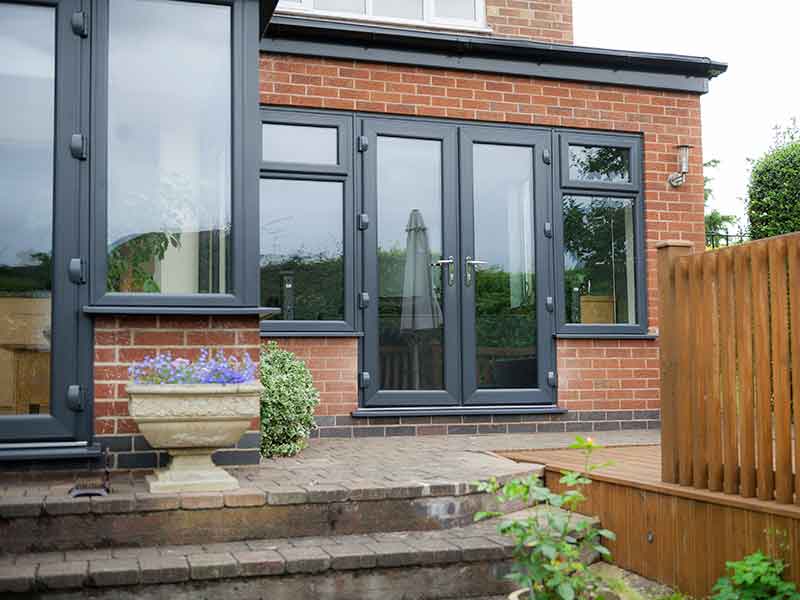Frequently Asked Questions
What is double glazing? Why use double glazing?
Double glazing refers to a window comprised of two glass panes (known as an insulated glass unit, or IGU) containing insulating argon gas between said panes. This IGU is placed in a frame of either uPVC, aluminium or timber. Fitting a second pane of glass for insulation purposes can be traced as far back as the late 1800s – but the widespread adoption of this design rocketed in 2002, as building regulations required replacement windows to be a minimum double glazed C rated. The key benefit of double-paned windows derives from thermal insulation –retaining heat whilst simultaneously stopping cold gusts of air from the outside. Furthermore, double glazing significantly reduces noise pollution and saves on your energy bills.
At Mr. Window, we use low emissivity glass (or low-e glass), which is a type of energy efficient glass designed to enhance thermal insulation and further stop heat escaping out of your windows. This allows you to keep your room at the right temperature whilst being incredibly energy efficient. We’re so confident in our windows, we offer a Ten Year Guarantee on all installations! So, if you’re looking to install new windows, look no further – Mr. Window is here to help.
What causes condensation in double glazing?
Condensation typically occurs because the sealant has faltered – this failure permits hot, moist air from within your home to enter the gaps between the panes, where it reverts to water after hitting the colder surface. Condensation will then foster the growth of mould and ultimately ruin your window. To prevent this, try to keep rooms as ventilated as possible, as frequently as possible. However, if you have noticed condensation give us a call – we’ll be happy to help. It might be time to install new windows designed specifically to your liking.
What type of windows do I need? Which window is best for home?
There is no right answer to this question, as it will depend on your wants and needs… but don’t worry! We are here to answer any question – no matter how big or small – you may have. Our windows are all A+ rated as standard, and we offer a Ten-Year Guarantee on all window installations. We provide a variety of different windows:
- What are Casement Windows? These windows open horizontally on hinges, pivoting much like a door. A common choice, they’re capable of cooling a house by directing cold air inside and offer quality protection against both drafts and intruders!
- What are Bay Windows? A window space projecting outward from the walls of a house – forms a bay in the room. This design can help open up your living space, giving your home a spacious ambience.
- What are Sliding Sash Windows? A window consisting of two panels (or sashes), with one in front of the other. Instead of pushing the window outwards, these windows are manoeuvred upwards to open, permitting greater airflow in the warmer seasons.
- What are Tilt and Turn Windows? These open inwards, which can be a great benefit if you’re concerned about space, safety, and ventilation. They can be styled to either fully open or open on an angled ’tilt’, giving a smaller gap for ventilation.
- What are Heritage Flush Windows? Do you live in a ‘listed’ building? Or maybe you have a vintage décor, and want the correct windows to accompany your home? Heritage windows are designed to appear authentically traditional whilst taking advantage of modern-day safety and heat retention technology.
If you have more questions or queries about windows, feel free to give us a call. We’re always happy to help… after all, that’s what we’re here for.
What type of doors do I need? Which door is best for home?
Different homes and different buildings have different needs – but we’re sure we’ll be able to help! Each of our doors utilise ‘A Rated’ glass as standard and we offer a Ten-Year Guarantee on all styles – you only need to be concerned with the design, and we’re happy to assist here too. Take a look at our interactive door designer tool if you’re eager to see what you can create! We have a variety of different doors:
- What are Bi-Fold Doors? These are capable of being ‘folded’ into at least two parts, but commonly consist of more foldable panels. Bi-Fold doors combine your outdoor and indoor living spaces, letting the light and visuals from outside, inside.
- What are Composite Doors? These are made from a variety of different materials, pressed and glued together under industrial pressure conditions. They’re thicker and more durable than single material doors, with a quality finish that’s easy to maintain.
- What are French Doors? These utilise a ‘light’ construction, typically styled with large glass panes. They open outwards as opposed to sliding on a track, and offer a charming design for those creating a vintage atmosphere in the homeplace.
- What are Panel Doors? These are created by fitting many panels together as opposed to using a single slab of wood/uPVC. These panels are usually shaped to pattern, and therefore have an aesthetic appeal which can enhance the design of your home.
- What are Patio Doors? Commonly known as sliding glass doors, they come in a wide range of materials and typically consist of 2 to 4 glass panes set in tracks which slide to open. They’re a great choice for both ventilation and natural light.
We know how important it is to choose your dream door, so if you have any more questions or queries, feel free to give us a call. Our expert fitters will help you every step of the way.
Is uPVC safe?
Great news, you can put your mind at ease! In its finished form uPVC is not toxic and absolutely safe throughout the entirety of its lifespan. Furthermore, uPVC is incredibly durable and secure, meaning you’ll have peace of mind whether it’s your windows or doors that take advantage of this strong but lightweight material.
How long can uPVC windows last?
uPVC windows are famed for their durability and longevity – they can last up to 30 years if they are maintained. You can maintain uPVC windows by cleaning the frames and glass, lubricating the various mechanisms and monitoring all working parts. If you’re worried, don’t forget all our windows come with a 10 Year Guarantee to give you peace of mind.
How do I replace my windows? How do I remove an old window?
Revamping your windows can be a complex task that requires proper precautions. Make sure you have safety goggles and heavy-duty gloves before starting. Gather essential tools like a screwdriver, long bar, club hammer, and handsaw. Unscrew the hinges of opening windows and panels, then carefully remove fixed panes. Make angled cuts in the frame and use a hammer to remove it. However, if you’re not a registered installer, apply for Building Control approval to meet energy efficiency requirements. Alternatively, rely on our expertise. With over 20 years of experience, we’re qualified window replacement specialists. Contact us for a professional, high-quality, and graceful window replacement experience. Trust us to handle the job with precision and transform your windows for enhanced energy efficiency and aesthetics.
Can I fit a window myself?
Yes! So long as you conform to the standards set by Building Control, you can. However, if you’re not a registered installer, you’ll need to complete an application. As windows are our trade, we can self-certify, streamlining this whole process. We’re FENSA certified, so, if you are at all worried about this task, you can always use our services and guarantee yourself high quality work without any of the hassle!
What is better uPVC or aluminium?
The better choice is entirely dependent on the situation – uPVC windows offer easy maintenance, better thermal insulating, and are notably durable. On the other hand, Aluminium is typically stronger than uPVC and they’re incredibly environmentally friendly. What you need will depend on your scenario. So, feel free to get in contact and we’ll find the right fit for you.
Can I hang a door myself?
Yes, you can! Typically, you’ll need planning permission if you’re building anything brand new on the property, or making major changes. If the door is more than 50% glass, you’ll have to register it with FENSA. However, you can do it yourself, you can self-certify with the local council, and there are many guides online on how to do this. Alternatively, we can hang your doors. We’re FENSA certified and incredibly experienced in hanging doors, so if you’ve got a door that needs replacing, please give us a call. We’ll carry out the job with enthusiasm and professionalism.





